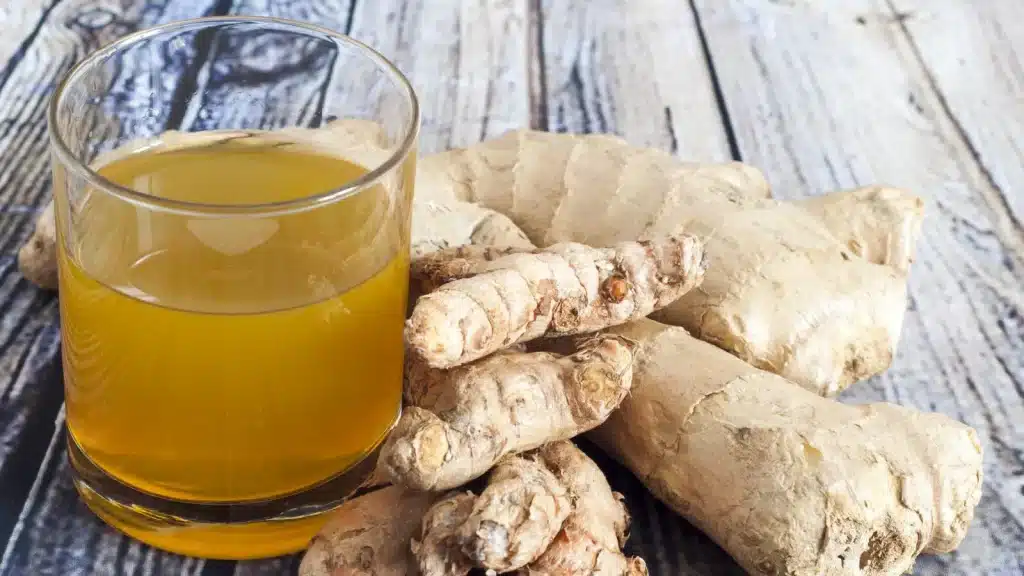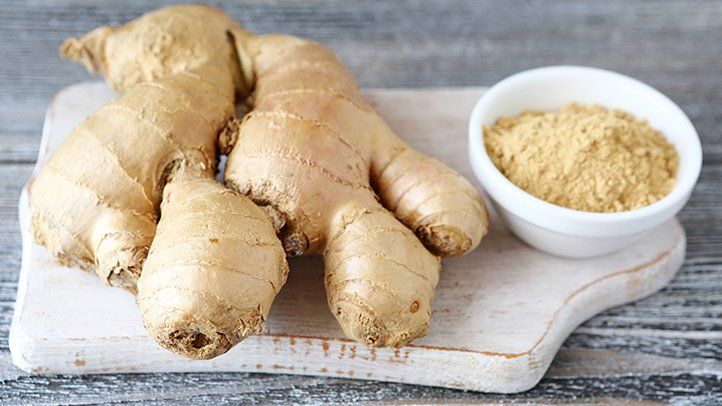Ginger is a plant with a fragrant, spicy root that is used as a seasoning and traditional medicine. The root is peeled and can be grated, sliced, or chopped and used fresh or dried in cooking, baking, and other culinary applications.
Table of Contents
A popular ingredient in Asian and Indian cuisine, and is used in dishes like stir-fries, curries, and marinades. It is also used in drinks like tea and ginger beer.

It’s believed to have anti-inflammatory and digestive health benefits, and has been used for centuries in traditional medicine to treat a variety of ailments.
RELATED: Ceylon Cloves|Benefits|Uses
Nutritional Facts
Ginger is a nutritious food with a number of essential vitamins and minerals.

Here are some of the key nutritional facts for ginger:
- Carbohydrates: Ginger contains carbohydrates, including sugars and dietary fiber, but is low in calories.
- Vitamin B6: Is a good source of vitamin B6, which is important for maintaining healthy skin, brain function, and metabolism.
- Magnesium: A good source of magnesium, which is important for maintaining healthy bones and muscle function.
- Manganese: A good source of manganese, which is important for maintaining healthy skin, bones, and metabolism.
- Potassium: Also contains potassium, which is important for maintaining healthy blood pressure and electrolyte balance.
- Other vitamins and minerals: Contains small amounts of other vitamins and minerals, including vitamin C, iron, and calcium.
It is important to note that the nutritional content of ginger can vary based on the form it is consumed in, such as fresh or dried ginger, and the serving size.
Healthy Benefits
Ginger has several potential health benefits, including:
Anti-inflammatory:
Ginger has been found to have anti-inflammatory properties that may help reduce inflammation in the body.

Some of the ways that ginger may help reduce inflammation include:
- Inhibiting the production of certain inflammatory compounds: Has been found to inhibit the production of certain pro-inflammatory compounds, such as cytokines and prostaglandins, which can help reduce inflammation in the body.
- Reducing oxidative stress: Has antioxidant properties that may help reduce oxidative stress, which is a contributing factor to inflammation in the body.
- Improving immune function: It improves immune function, which can help reduce inflammation in the body.
- Modulating the immune response: It modulate the immune response, which can help reduce inflammation in the body.
Digestion:
Ginger has been used for centuries to help improve digestion, and some studies suggest that it may have the following effects:
- Reducing bloating and gas: Helps in reducing bloating and gas, which can be uncomfortable symptoms of indigestion.
- Stimulating digestive juices: It stimulate the production of digestive juices, such as saliva, gastric juice, and bile, which can help improve digestion.
- Reducing inflammation in the gut: Has anti-inflammatory properties that may help reduce inflammation in the gut, which can help improve symptoms of indigestion.
- Relieving constipation: It has a mild laxative effect that can help relieve constipation, a common digestive issue.
- Alleviating heartburn: Helps in relieve heartburn by reducing the production of stomach acid.
Nausea relief:
Ginger has been used for centuries to help relieve nausea and vomiting, and some studies suggest that it may be effective for this purpose.

It works by blocking certain signals in the brain that trigger nausea and vomiting, and it may also help speed up the emptying of the stomach, which can help relieve symptoms of nausea.
Some of the ways that ginger may help relieve nausea include:
- Motion sickness: It’s effective in reducing symptoms of motion sickness, such as dizziness, nausea, and vomiting.
- Morning sickness: Some studies have found that ginger may help reduce symptoms of morning sickness in pregnant women.
- Chemotherapy-induced nausea: Effective in reducing nausea and vomiting caused by chemotherapy in some individuals.
- Nausea due to surgery: Effective in reducing postoperative nausea in some individuals.
Cardiovascular health:
Ginger has been studied for its potential benefits for cardiovascular health, and some preliminary studies suggest that it may have the following effects:
- Reducing inflammation: Also it has anti-inflammatory properties that may help reduce inflammation in the body, which is a risk factor for cardiovascular disease.
- Lowering blood pressure: Some studies have suggested that ginger may help lower blood pressure, which is a major risk factor for heart disease and stroke.
- Improving cholesterol levels: Some preliminary studies have found that ginger may help improve cholesterol levels, which can help reduce the risk of heart disease.
- Reducing oxidative stress: Has antioxidant properties that may help reduce oxidative stress, which is another risk factor for cardiovascular disease.
Anti-cancer properties:
Ginger has been studied for its potential anti-cancer properties, but more research is needed to fully understand its effects. Some preliminary studies have suggested that ginger may have anti-cancer effects by:
- Inhibiting cell growth: It may inhibit the growth and spread of certain types of cancer cells, such as ovarian, colon, and prostate cancer cells.
- Inducing cell death: Some studies have shown that ginger may induce apoptosis (cell death) in cancer cells, which may help prevent their spread.
- Reducing oxidative stress: It antioxidant properties that may help reduce oxidative stress and inflammation, which are factors that can contribute to the development of cancer.
- Targeting signaling pathways: Some studies suggest that ginger may target signaling pathways that are involved in cancer cell growth and survival, which may help prevent the spread of cancer.
RELATED: All To Know About Garlic
Uses
Ginger is a popular spice and ingredient in many cuisines and traditional medicine systems around the world. Some of the most common uses of ginger include:
- Culinary uses: Used in cooking and baking to add flavor and aroma to a variety of dishes, including soups, stews, curries, and baked goods.
- Tea: Ginger is often used to make tea, which is consumed for its medicinal properties and refreshing flavor.
- Supplement: Available in supplement form, including capsules, tablets, and extracts, and is commonly used for its potential health benefits.
- Aromatherapy: Essential oil is used in aromatherapy for its energizing and uplifting properties.
- Beauty products: Extract is used in some beauty and personal care products, including shampoos, conditioners, and body lotions, for its potential anti-inflammatory and antioxidant properties.
- Traditional medicine: Ginger has been used in traditional medicine systems for thousands of years, including Ayurveda, Chinese medicine, and Unani, for its potential health benefits.
Best Time To Take It
The best time to take ginger may depend on the individual and their specific health concerns. Here are a few general recommendations:
- For nausea relief: Commonly taken before or after meals to help relieve nausea and vomiting.
- For digestive health: Can be taken with meals to help improve digestion and reduce bloating and gas.
- For menstrual cramps: Some people take ginger supplements during their menstrual cycle to help relieve menstrual cramps.
- For inflammation: Can be taken throughout the day to help reduce inflammation and support overall health.
It is important to note that these are general recommendations and that the best time to take ginger may vary based on individual needs and preferences. Before taking ginger or any other supplements, individuals should consult with their healthcare provider to determine the best course of action for their specific health concerns.
Is It Good For People With Ulcers
In addition has been found to have some potential benefits for people with ulcers. Some studies suggest that ginger may help:
- Reduce symptoms of indigestion: It’s in help reduce symptoms of indigestion, which can be a common issue for people with ulcers.
- Promote healing of ulcers: Its has been found to have anti-inflammatory properties that may help promote the healing of ulcers.
- Reduce gastric acid production: Also has been found to help reduce gastric acid production, which can be beneficial for people with ulcers that are caused or exacerbated by excessive acid production.

